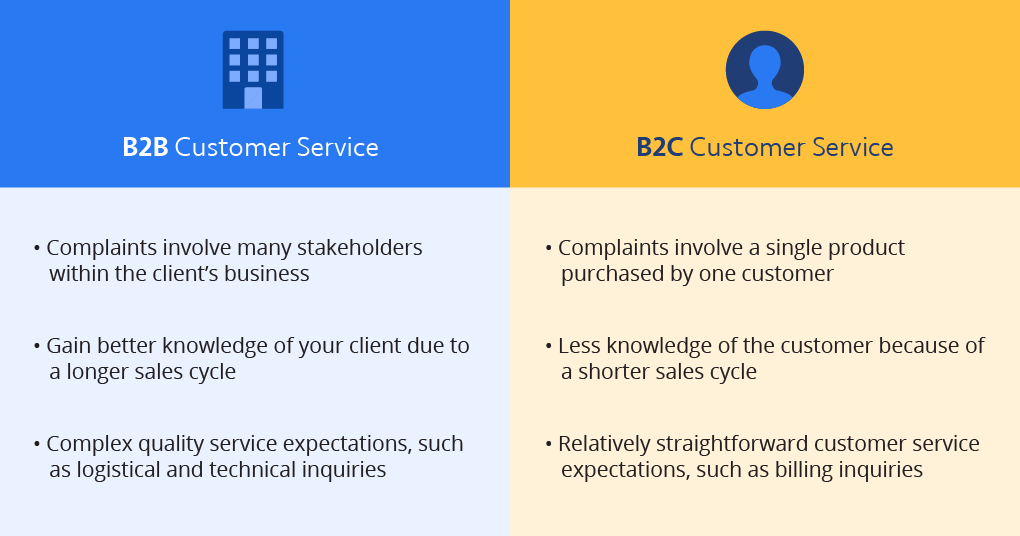The Ultimate Guide to B2B Customer Service Strategy


Dalia Arroyo
Welcome to the Ultimate Guide to B2B Customer Service Strategy! Our goal is to cover everything you need to know for your customer care services to thrive. Even if you already have a customer service strategy in place, there is still something you could learn from this guide to improve your processes.
In this guide, we will discuss:
- Building your own customer service team
- Implementing a customer onboarding process
- Strategies for customer retention
- Building brand advocacy and customer loyalty
Before we dive in, let’s define what B2B customer service is and why it’s important.

The Ultimate Guide to B2B Customer Service Strategy
Learn how to turn customers into brand advocates using our free customer service strategy guide.
What is B2B customer service?
B2B customer service is assisting another business with the product or service they purchased through you. However, it’s also going above and beyond to ensure your customers are getting the most out of your product. This means promptly communicating with your clients and doing all you can to fix any issues they may experience.
Why is B2B customer service important?
A well built customer service experience, compared to a poorly structured one, will make all the difference for your company’s success. A recent study found that 62% of businesses purchased more products after a positive customer care experience.
But what key attribute is needed for the basis of your customer care strategy? Just like any relationship, trust is the foundation for a successful partnership between you and your clients.
As that trust builds, your customer retention rate will increase. A higher retention rate is beneficial for multiple reasons:
Higher customer lifetime value
Lower customer acquisition costs
Receiving useful feedback
Free word-of-mouth advertising
Thanks to a higher retention rate, you will begin to build customer loyalty. Customer loyalty ensures that your clients are unlikely to leave you for another company and provides opportunities for these loyal clients to refer you to other businesses. An increase in revenue from these referrals is another byproduct of giving your customers an effective customer service experience.
Remember, this guide is primarily focused on B2B customer service. Although both B2B and B2C customer service aims to boost customer satisfaction, they have different approaches.
B2B vs. B2C customer service
Just a quick reminder: B2B businesses sell their products or services to other businesses, and B2C companies are focused on selling to individual consumers. Because they target different types of audiences, their customer service operations and strategies differ in a number of ways.
What are other differences between customer service in these two industries?

Although customer service is important for both, a poorly constructed B2B customer service program has a higher risk than a B2C customer experience. If your B2B customer service team doesn’t provide a positive experience for the client, then your company could lose thousands of dollars. On the other hand, a B2C business would only lose a single customer, or a smaller percentage of their revenue.
In order to ensure your company doesn’t lose revenue from a poorly executed customer service experience, it’s important to know how customer service fits in the buyer’s journey.
How does customer service fit into the B2B buyer’s journey?
The B2B buyer’s journey is the process a client goes through before, during, and after making a purchase.
The buyer will go through 5 stages:
- Awareness
- Consideration
- Decision
- Growth
- Delight
Each stage is equally important to ensure a positive experience for your customer. While there are teams that should be involved in each stage, your customer service department should be there to offer a hand throughout the entire journey.

However, the growth and delight stages are both driven by the customer service team. Overlooking the importance of these stages — as some companies do — is a surefire way to lower retention rates. That’s why it’s crucial you have a customer service team in place to be there for your clients during these two stages.
The growth stage is where your team helps the client properly onboard, retain them, and increase customer lifetime value. This stage is critical for clients to get the most out of your solution. During this stage, you can identify opportunities to upsell or cross-sell by learning more about how they plan to use your product.
The growth stage is more than just helping your customers grow into your solution. It is also during this stage that your customer service team can increase the value of customer accounts through these tactics.
The delight stage is another stage that the customer service team plays the biggest part in. This stage is the time to build meaningful customer relationships that lead to long-term loyalty. Keeping customers satisfied while providing convenient support is the backbone of the delight stage. During this stage, your customer consultant should provide one-to-one communication, proactively care for the customer to promote brand loyalty, and even provide exclusive offers.
To learn more about the buyer journey’s stages and how to build loyalty in each stage, we recommend reading our guide about the B2B buyer’s journey.
As you can see, knowing what B2B customer service is and where it fits in the buyer’s journey is key to an effective, holistic customer experience. The following chapters will help you build upon your strategy.

The Ultimate Guide to B2B Customer Service Strategy
Learn how to turn customers into brand advocates using our free customer service strategy guide.

